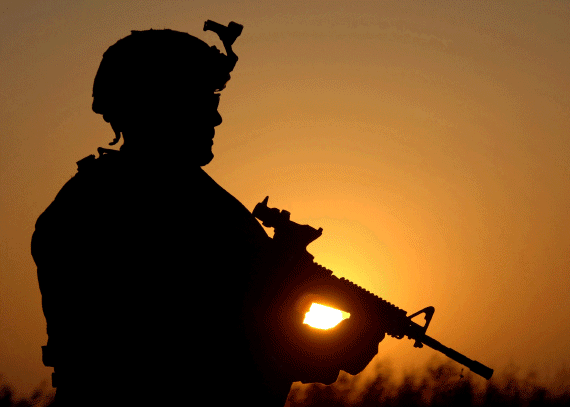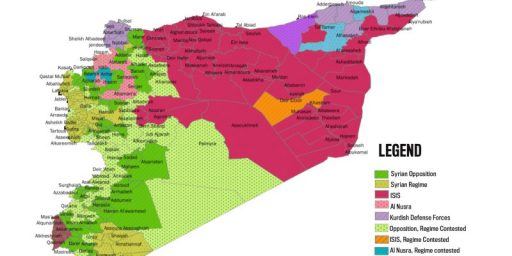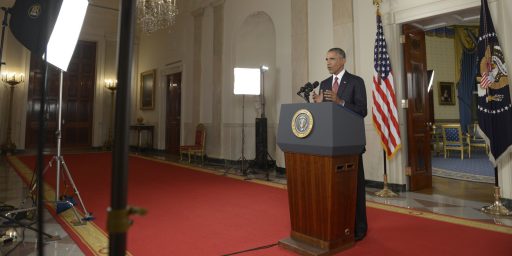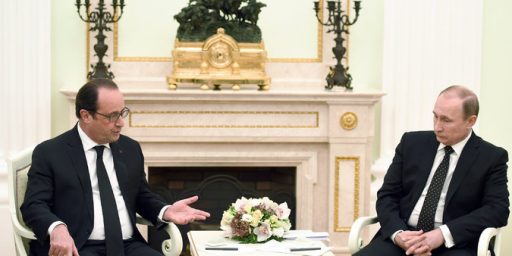Americans Support Air Strikes Against ISIS, Oppose Ground Troops
The American public's support for the President's war against ISIS has its limits.
A new CNN/ORC International poll shows Americans backing airstrikes against ISIS in Iraq and Syria, but largely opposed to the use of American ground forces even though they seem to think that such a development is inevitable:
(CNN) — Americans are steadfastly opposed to sending U.S. ground troops to fight ISIS in Iraq and Syria, but an overwhelming number of people continue to support the U.S.-led airstrikes against the terrorist group, a new CNN/ORC International poll shows.
While less than four in 10 Americans favor sending U.S. ground troops into a combat situation against ISIS, there is a widespread belief that such an action is inevitable, according to the poll.
Only 24% of Americans do not think the United States will send combat troops to battle ISIS, while 36% say it is likely and another 39% say it is somewhat likely.
(…)
The formation of the international coalition of countries working with the United States to destroy ISIS is what appears to be giving Obama a boost of support from the American public for military action against ISIS. Seventy three percent of Americans back the joint U.S. and ally airstrikes, but support drops to 50% if the mission had been undertaken solely by the United States.
Americans have a weary eye about one piece of the plan to defeat ISIS: arming the moderate Syrian rebels. While Congress approved legislation before it left for the campaign trail to allow for the arming and training of the rebels, only 42% of Americans favor this action, and 54% oppose it.
Still, there is an undeniable belief among Americans that ISIS poses some level of threat to the United States, with 45% describing it as “very serious,” 23% saying it is “fairly serious” and 23% noting that it is “somewhat serious.”
The poll also shows that recent events have led to a slight uptick in the President’s job approval numbers, at least as measured by the CNN poll. Both public opinion of how the President is handling the issue of terrorism in general and the fight against ISIS specifically have increased since the polls that were taken before the President’s speech earlier this month. There was also a slight up-tick in the President’s job approval, although the polling average there hasn’t moved very much in the past month. To a large degree, this is likely all a result of the fact that the public continues to view ISIS as a threat — with 45% of respondents called it “very serious,” 23% say that it is “fairly serious” and 23% calling it ”somewhat serious” — and they generally inevitable ‘rally” effect that Presidents tend to see when these situations arise. The fact that the war, such as it is, is essentially limited to air strikes at this point is also influencing public opinion since it means that American casualties, and more importantly, the image of American casualties on our televisions, is largely non-existent at this point. As long as we’re in this stage of the conflict, it’s likely that public support for the President’s policies will remain high.
These numbers do explain one though, though, and that’s the reason why the President and other Administration officials continue to say that American ground troops will not be necessary in this conflict with ISIS. As I’ve noted before, both the Chairman of the Joint Chiefs and the Army Chief of Staff have reviewed to rule the possibility out, and several members of Congress, mostly on the right, have begun saying that we will eventually need to consider ground troops. Just yesterday, for example, House Speaker John Boehner said that the U.S. may have no choice on the matter. Notwithstanding these comments, though, poll numbers such as those reflected here, which are roughly similar to an NBC News poll conducted three weeks ago, show that there is potentially tremendous political downside for the Administration in acknowledging that ground troops may, perhaps, will be needed if the President’s plan, such as it is, is going to work. Obviously, the President’s advisers have concluded that the best way to “sell” the war to the American public is to downplay the possibility of American combat troops getting involved. That may be smart politics, especially as we head into the midterms, but it strikes me that the Administration is taking a huge risk. If we do get the point that ground troops are needed, then the President is obviously going to take a lot of heat because of his previous comments, and support for the war will likely take a hit in the polls. As I noted before, the smarter strategy would be for the President to be honest with the American people about what may be required to complete the goals that he has set. This kind of prevarication on an important aspect of a war that both Administration and Pentagon officials are saying could last years is not a good way to start.







The superfluous apostrophe in the title of this post is killing me.
@Mikey:
No kidding. I wonder who that American is?*
*You know we’re not razzing you due to malice, right Doug?
As one who considers ISIS to be “somewhat serious” (sort of, after a fashion) just exactly what is it that ground troops are supposed to allow us to accomplish?
@OzarkHillbilly:
That part is never explained.
Once we put troops in you can start the countdown to ignominious withdrawal. IS will bend every effort toward capturing American soldiers. Then come the snuff films. And then we’re looking for the door.
Obama said no ground troops in Libya, and it was no ground troops in Libya. We can drop bombs forever.
It – support of airstrikes – is the primary reason why Americans overwhelmingly supported going to wear in Iraq in 2003. As long as we thought we could ‘shock and awe’ our way to a short quick, no problems victory, then everything was fine.
It’s only when we commit troops to a war that seemingly has no clear end, that Americans lose patience. Then we get the nightly news reports of the deaths and casualties of our troops, and it’s not long before the public changes it’s mind about the efficacy of our involvement in the conflict.
As long as we’re conducting airstrikes against ISIS it seems likely that Obama will retain at least ambivalent public support. If, however, we end up with an attack on an American embassy in the region that seems to be the work of ISIS, or a related cell, then all bets are off (except the bet that Americans will become opposed to the Airstrikes).
@OzarkHillbilly: @michael reynolds: Answering Ozark’s question requires knowing what the desired objective is. That has not been made clear beyond “degrade and destroy.”
If the objective is just to contain ISIS until it withers away (assuming it would), what we’re doing will probably suffice.
On the other hand, if it’s determined ISIS needs to be rooted out and killed off, ground troops will be necessary. Unless we’re willing to flatten whole towns and kill the innocent along with the guilty, someone will have to go in and fight them man-to-man. This doesn’t mean they have to be ours, of course, besides the “advisers.”
Another way to phrase this , Doug, is “American public supports the current US strategy, which appears to be working.” As to ground troops , the Administration has been honest as to when US ground troops would be committed. It would be only if there was imminent danger of a strike on the US homeland. General Dempsaey has been clear enough about this, even though you pretend he has not been.
I think it’s also time for you to admit that the Administration has done a very effective job of coalition building. The image of the the female UAE pilot going on a bombing raid has done a lot to reconcile Americans to the idea that the allies actually are contributing.
@Mikey:
People who ask for some type of clear long term strategy kind of crack me up a little bit. First of all, no long term strategy survives contact with the battlefield. The Very Serious pundits seem to want the USA to have something like a Schiefflen Plan for the Middle East, with precise goals, timetables and everyting calculated in advance. People should first of all recognise that a Schlieffen Plan is impossible in the Middle East situation. Secondly, people need to realise that the Schlieffen Plan DID NOT WORK, that it started to go wrong almost from Day One.
In our favorite war, the USA had a great plan for defeating the Japanese should they attack the US in the Pacific. That plan was obsolete ten minutes after the actual Japanese attack, which was at a place and time not envisaged in the plan.
@Mikey:
But not sufficient. Divine intervention might also be necessary.
Seriously, what historical precedent or current proposal makes it even vaguely plausible that we (or anyone) could “root out and kill off” ISIS? When has such a thing ever happened before?
What makes you think that going in and “fighting them man-to-man” would somehow avoid flattening whole towns and killing the innocent along with the guilty?
As for the title of this article, well. “Americans support killing others; oppose being killed”. Duh.
@DrDaveT:
The Battle of Berlin springs immediately to mind. Block-to-block and house-to-house fighting wherein the Red Army systematically rooted out the Germans and took the city.
It likely would (see the aforementioned Battle of Berlin). I was differentiating between bombing the place flat from the air and exercising some discrimination between ISIS and the civilian population.
The extreme difficulty of actually succeeding in doing so would doubtless be a major deterrent to actually deploying ground troops.
Also keep in mind I am not advocating the deployment of ground troops, just suggesting circumstances that might lead to it. We may well continue operations against ISIS for a very long time and never do a large-scale deployment.
@stonetools: Old military saying: “No plan survives enemy contact intact.”
@Mikey: Eisenhower said (probably apocryphal, it’s too good) “Plans are useless, planning is essential”. Obama needs a plan. The fact that it will be changing hourly as the situation changes is one of numerous good reasons he shouldn’t be sharing that plan with Doug and James or any other Republican, who would bitch about any deviation. Also, they would immediately share it with ISIS. (Who, one expects, do a good job of monitoring the English language intertubes.)
If “boots on the ground” are needed, let the nations in the middle east that are actually threatened by ISIS provide them. Air support, intelligence, & logistical support is an appropriate role for the US.
@Mikey:
I would bet a $1,000.00 that the goal is containment. I am also even more certain that Obama is not using such rhetoric for obvious political reasons.
I think Doug is being a little dishonest himself in not admitting the clear political restraints in Obama not using more “honest” rhetoric, especially in this political season.
If the Democrats retain the Senate, I would not be surprised to see Obama walk back his rhetoric from “degrade and destroy” to just “degrade”-at which time Doug will excoriate him for “changing the plan.”
@Mikey:
I think you’ve put your finger on it; people aren’t clear on the end state we hope to achieve. If the idea is to obliterate IS and never see them again, we’ll need the 82nd. If the idea is to contain and let them wither, I think we’ve got just the right approach.
I assume and have believed from the start that we are playing Option B: Containment. That’s what matches the actions we’re taking. It’s also smart politically – it’s what the American people will support.
I would be curious what the American people think is a threat, serious or otherwise. Kidnapping? Beheading? Blown up building, subway? Invasion? These kind of polling questions strike me as somewhat useless because they discuss some vague “threat”, not a specific action to react against.
And the danger is, is that politicians and policy makers use these useless polling questions to make and executive policy.
@michael reynolds:
That’s a primary consideration, of course. The level of threat posed by IS would have to be very high indeed before the American people would accept sending in the 82nd. And there would have to be very firm and verifiable evidence supporting that level of threat. No more going to war based on B. S.
At least, I hope not…
@Mikey:
And this destroyed Nazism as an organized movement…?
It’s easy to kill people. It is very, very difficult to kill a movement, especially one with a fanatic multinational base. ISIS is not a fixed set of people in a delineated place, such that if you kill them all it’s over.
@DrDaveT:
We’re not seeing convoys full of Nazis taking over Bavarian towns, are we?
The Red Army didn’t kill every single German soldier. They just killed enough of them. The point wasn’t killing Germans for its own sake, it was to eliminate the Wehrmacht’s hold on a given geographical area.
We can contain IS with airstrikes, but it will take ground forces to actually eliminate their hold on the cities they have. Doesn’t mean those forces have to kill every last one, or even destroy IS as an organized movement.
@Mikey:
Absolutely.
If you don’t get rid of the movement, taking back the cities is temporary. Unlike the German army, IS is not tied to a political leadership that can surrender on behalf of everyone, nor to a particular piece of turf. And even in Germany, how long did the occupying forces end up staying?
As far as I can tell, you’re saying we should do to ISIS what we did to the Taliban — which is still going strong, last time I checked. What am I missing here? Why would we be much more successful against ISIS than against the Taliban?
@DrDaveT: The Taliban are far more numerous and spread out than IS. The advantage we have now is IS is still confined to a relatively (as in relative to the Taliban) limited geographic area. If the employment of airpower succeeds in keeping them there, it will be a very different picture indeed from the Taliban. At this point the airstrikes are being “controlled” from the JOC using drone imagery so American JTACs don’t have to get anywhere near a direct-fire engagement.
Of course, all this depends, as I stated in my original comment, on what the President and his advisers decide the objective(s) are. And there’s no requirement ground troops, if they are eventually employed, must be American.
Right now the airstrikes seem to be stopping IS where they are, which is fine by me. If the President decides his objectives require a different combination of strategy and tactics, we’ll judge those when we see them. I’m certainly not advocating employing American ground troops beyond the relatively small number of advisers we already have.